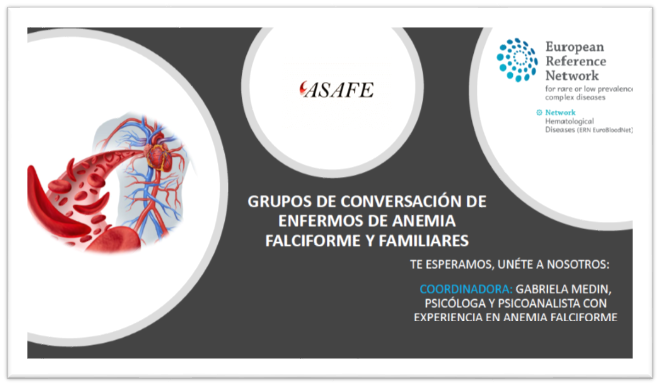Sickle Cell Disease Patients Conversation Group With A Psychotherapist

The experience of the pilot had in Spain via the Patients Association ASAFE.
The project of having a Conversation Group guided by a psychotherapist for Sickle Disease Patients has been proposed and launched by the Spanish National SCD Patient Association: Asociación Española de Enfermedad Falciforme (ASAFE). The association has identified a psychotherapist for guiding the conversation group. The healthcare professional selected worked already with SCD patients in a reference center for SCD, Member of the ERN-EuroBloodNet (Hospital General Universitario Gregorio Marañón de Madrid).
The importance of having such a group of conversation is because psychological support services are not always available for Rare Disease Patients, for several reasons. Service could not be available in the hospitals aS they are not considered in the framework of national health programs. And also, from public opinion perspective there is a strong stigmatization and cultural reticence in being psychologically supported by a health professional.
For some diseases it is indeed crucial to have such a support, that is the case of the Sickle Cell Disease, a lifelong condition that put the patients and their families face many psychological challenges.
For instance:
- SCD is invisible to other people
- Numerous, severe and unpredictable manifestations since very first month of life
- The way diagnosis is accepted by the family and reactions to parents perceived by the child could be traumatic
- It is difficult to deal with limitations and constraints (Adjusting oneself to the condition)
- It is difficult to speak with others about the illness
- Body image and perception could be complex
- Self-confidence is difficult to be build
- Feeling different
- Difficult Projecting of oneself in the future
It has been decided to have two different groups of conversation: one for patients and the other for caregivers: parents, brothers and sisters or partner in love, wife and husband. The meetings lasted 90 minutes, with a cadency of one each 3 months, for 4 in a year. The group consisted of an average of 20 participants.
Participants had the chance to share experiences and problems related to SCD, with the professional support of a psychotherapist that helped in understanding and dealing with the psychologic consequences of the disease, develop self-confidence and improve quality of life.
